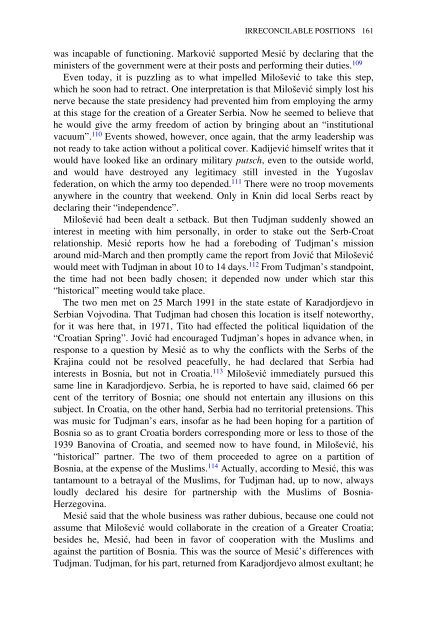Yugoslavia: A History of its Demise - Indymedia
Yugoslavia: A History of its Demise - Indymedia
Yugoslavia: A History of its Demise - Indymedia
Create successful ePaper yourself
Turn your PDF publications into a flip-book with our unique Google optimized e-Paper software.
IRRECONCILABLE POSITIONS 161<br />
was incapable <strong>of</strong> functioning. Marković supported Mesić by declaring that the<br />
ministers <strong>of</strong> the government were at their posts and performing their duties. 109<br />
Even today, it is puzzling as to what impelled Milošević to take this step,<br />
which he soon had to retract. One interpretation is that Milošević simply lost his<br />
nerve because the state presidency had prevented him from employing the army<br />
at this stage for the creation <strong>of</strong> a Greater Serbia. Now he seemed to believe that<br />
he would give the army freedom <strong>of</strong> action by bringing about an “institutional<br />
vacuum”. 110 Events showed, however, once again, that the army leadership was<br />
not ready to take action without a political cover. Kadijević himself writes that it<br />
would have looked like an ordinary military putsch, even to the outside world,<br />
and would have destroyed any legitimacy still invested in the Yugoslav<br />
federation, on which the army too depended. 111 There were no troop movements<br />
anywhere in the country that weekend. Only in Knin did local Serbs react by<br />
declaring their “independence”.<br />
Milošević had been dealt a setback. But then Tudjman suddenly showed an<br />
interest in meeting with him personally, in order to stake out the Serb-Croat<br />
relationship. Mesić reports how he had a foreboding <strong>of</strong> Tudjman’s mission<br />
around mid-March and then promptly came the report from Jović that Milošević<br />
would meet with Tudjman in about 10 to 14 days. 112 From Tudjman’s standpoint,<br />
the time had not been badly chosen; it depended now under which star this<br />
“historical” meeting would take place.<br />
The two men met on 25 March 1991 in the state estate <strong>of</strong> Karadjordjevo in<br />
Serbian Vojvodina. That Tudjman had chosen this location is <strong>its</strong>elf noteworthy,<br />
for it was here that, in 1971, Tito had effected the political liquidation <strong>of</strong> the<br />
“Croatian Spring”. Jović had encouraged Tudjman’s hopes in advance when, in<br />
response to a question by Mesić as to why the conflicts with the Serbs <strong>of</strong> the<br />
Krajina could not be resolved peacefully, he had declared that Serbia had<br />
interests in Bosnia, but not in Croatia. 113 Milošević immediately pursued this<br />
same line in Karadjordjevo. Serbia, he is reported to have said, claimed 66 per<br />
cent <strong>of</strong> the territory <strong>of</strong> Bosnia; one should not entertain any illusions on this<br />
subject. In Croatia, on the other hand, Serbia had no territorial pretensions. This<br />
was music for Tudjman’s ears, ins<strong>of</strong>ar as he had been hoping for a partition <strong>of</strong><br />
Bosnia so as to grant Croatia borders corresponding more or less to those <strong>of</strong> the<br />
1939 Banovina <strong>of</strong> Croatia, and seemed now to have found, in Milošević, his<br />
“historical” partner. The two <strong>of</strong> them proceeded to agree on a partition <strong>of</strong><br />
Bosnia, at the expense <strong>of</strong> the Muslims. 114 Actually, according to Mesić, this was<br />
tantamount to a betrayal <strong>of</strong> the Muslims, for Tudjman had, up to now, always<br />
loudly declared his desire for partnership with the Muslims <strong>of</strong> Bosnia-<br />
Herzegovina.<br />
Mesić said that the whole business was rather dubious, because one could not<br />
assume that Milošević would collaborate in the creation <strong>of</strong> a Greater Croatia;<br />
besides he, Mesić, had been in favor <strong>of</strong> cooperation with the Muslims and<br />
against the partition <strong>of</strong> Bosnia. This was the source <strong>of</strong> Mesić’s differences with<br />
Tudjman. Tudjman, for his part, returned from Karadjordjevo almost exultant; he
















